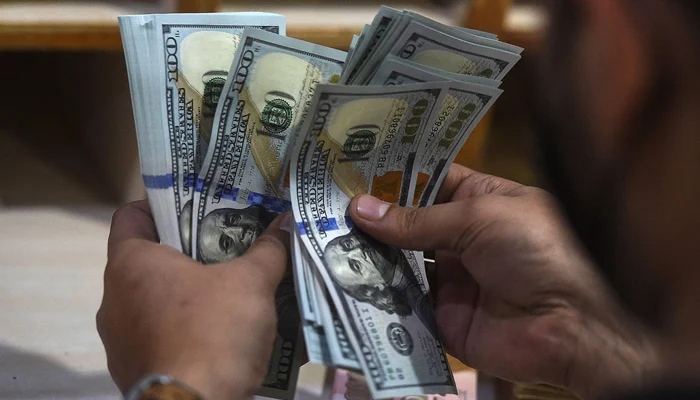SBP reserves fall by $237m to just over $7bn
KARACHI: The foreign exchange reserves held by the central bank dropped by $237 million to $7.020 billion in the week ending December 1, the State Bank of Pakistan said on Thursday.
The country's total reserves decreased by $286 million to $12.107 billion. The reserves of commercial banks are also down by $49 million to $5.087 billion.
The SBP attributed the decline in its reserves to repayments of external debt. High debt repayments continue to put pressure on the reserves. Last week, Saudi Arabia extended the term of a $3 billion deposit it placed with the SBP for another year. This deposit is set to mature on December 5. The Saudi deposit renewal will help maintain the cash-strapped country's foreign reserves and deal with external account issues.
The money was deposited by Saudi Arabia as a loan into the SBP in 2021, and it was rolled over in 2022. By the end of the current fiscal year, Pakistan's forex reserves held by the SBP could total $9 billion, according to estimates from the International Monetary Fund (IMF).
The Fund made the concerning prediction that remittances from overseas would drop by $3.5 billion, from an earlier projected target of $32.889 billion to $29.377 billion, for the current fiscal year ending on June 30, 2024, despite the IMF not foreseeing any gap on the external account front.
According to the Fund, the oil import cost might increase from $15.3 billion to $17.63 billion annually for the current fiscal year. The projection about the forex indicates that after the expiry of the ongoing $3 billion standby arrangement (SBA) programme, Pakistan would have to negotiate another medium-term IMF programme before the next fiscal year budget, 2024-25.
Pakistan has been struggling with hefty external debt repayments and diminishing foreign exchange reserves, which are enough to fund less than two months' worth of imports. Additionally, the government finds it difficult to obtain fresh foreign loans and is priced out of global markets.
Analysts stated that as the government gets closer to meeting its gross finance needs, the extension of the Saudi deposit strengthens the agreement with the IMF. Once the board gives its approval, this should assist in clearing the path for the next $700 million tranche under the stand-by arrangement. The total amount disbursed by the IMF will reach $1.9 billion if this tranche is approved by its board next month.
Securing external financing has been deemed by the IMF as a critical need for a $3 billion loan agreement reached with Pakistan in July when the nation was on the verge of a balance of payments crisis and sovereign debt default. Pakistan is expected to get funding worth $1.5 billion from international lenders, including multilateral partners, after the IMF approves the next loan tranche.
-
 Hailee Steinfeld Reveals Her Plans To Return To Music
Hailee Steinfeld Reveals Her Plans To Return To Music -
 Elon Musk Unveils SpaceX Plan For Civilian Moon, Mars Trips
Elon Musk Unveils SpaceX Plan For Civilian Moon, Mars Trips -
 MTG Commander Banned Update: Wizards Frees Infamous Instant-win Card
MTG Commander Banned Update: Wizards Frees Infamous Instant-win Card -
 Royal Family Braces For ‘final Blow’ As Andrew Scandal Deepens
Royal Family Braces For ‘final Blow’ As Andrew Scandal Deepens -
 Snow Forecast Warns Of Reduced Visibility And Travel Risks In Ontario
Snow Forecast Warns Of Reduced Visibility And Travel Risks In Ontario -
 Margot Robbie Reveals 'worst' Gift She Received From Co-star
Margot Robbie Reveals 'worst' Gift She Received From Co-star -
 Casey Wasserman Says He ‘deeply Regrets’ Ghislaine Maxwell Emails After DOJ File Release
Casey Wasserman Says He ‘deeply Regrets’ Ghislaine Maxwell Emails After DOJ File Release -
 Discord Face Scan Age Verification Rules Explained As Platform Tightens Access
Discord Face Scan Age Verification Rules Explained As Platform Tightens Access -
 Cavaliers Vs Nuggets Showdown Heats Up After Blockbuster Trade
Cavaliers Vs Nuggets Showdown Heats Up After Blockbuster Trade -
 Where Kelsea Ballerini, Chase Stokes Stand After Second Breakup
Where Kelsea Ballerini, Chase Stokes Stand After Second Breakup -
 'Disgraced' Andrew Hit With Reality Of Life Beyond Royal Bubble
'Disgraced' Andrew Hit With Reality Of Life Beyond Royal Bubble -
 Thunder Vs Lakers: LeBron James Playing As Lakers Miss Luka Dončić
Thunder Vs Lakers: LeBron James Playing As Lakers Miss Luka Dončić -
 Pistons Vs Hornets Recap: Brawl Erupts With 4 Players Getting Tossed Before Detroit Victory
Pistons Vs Hornets Recap: Brawl Erupts With 4 Players Getting Tossed Before Detroit Victory -
 Gordie Howe Bridge Faces Uncertainty After Trump Warning To Canada
Gordie Howe Bridge Faces Uncertainty After Trump Warning To Canada -
 Air Canada’s Flights To Cuba Halted As Aviation Fuel Crisis Worsens
Air Canada’s Flights To Cuba Halted As Aviation Fuel Crisis Worsens -
 Marc Anthony Weighs In On Beckham Family Rift
Marc Anthony Weighs In On Beckham Family Rift




